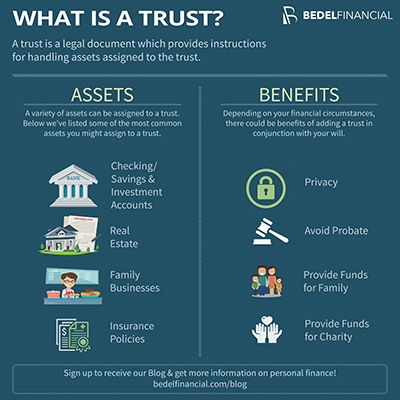
What is a trust and why would you create one? A trust can be a helpful vehicle in accomplishing your management and estate distribution goals. However, it is important to gain a basic understanding of what a trust can and cannot do.
Anyone who has worked with an attorney to create a will or attended a seminar on estate planning has listened to countless explanations regarding the benefits of a trust. Yet, many remain confused about what it is and what benefits a trust can provide.
Many people assume that trusts are very complicated and are used by only the very wealthy. While trusts are most likely to be included in the estate plans of wealthy individuals, the use of trusts in more modest estates is becoming more prevalent.
What is a "Trust"?
A trust is merely words on a piece of paper. It is a legal document that provides instructions for the handling of any assets assigned to the trust. It is not itself an "account". A trust is a shell that remains empty unless or until assets are assigned to it. The creator of the trust can assign assets to the trust during his/her lifetime or at the time of his/her death through directions provided in the will.
The trust document outlines how and by whom the assets should be managed; indicates the beneficiaries of the trust; gives detail concerning the expenses that the trust can pay; outlines the distribution of income and principle that can be made from the trust; along with many other provisions.
Flexible Estate Planning Tool
A trust is generally used to distribute assets to heirs in a particular manner. A typical use is by parents who want to provide structure for the management and use of assets that may be inherited by minor-aged children. In this case, the trust document may indicate that the assets should be managed by the named trustee (an individual or a financial institution) and distributed for the benefit of the children. The trustee may be given the discretion to distribute funds as necessary to pay living and educational expenses for the children. The trust document will indicate at what age or ages the assets of the trust should be turned over to the children. A typical provision may distribute one-third of the funds when a child reaches the age of 25; one-half of the remaining trust assets at age 30; and the remainder of the trust at the age of 35 years.
A trust is the most flexible and useful document available to you as you plan for the distribution of your assets. If you can communicate your wishes to the attorney, the trust provisions can be written to reflect your desires. Many times the distribution of assets will be directed by a formula intended to reward accomplishments or milestones during a beneficiary's lifetime. For wealthy individuals who fear that their children will lack motivation to lead productive lives if they have too much money, a trust can restrict the flow of funds unless certain benchmarks are met. In this case, a simple formula for the distribution of funds is to direct the trust to match the earnings of the beneficiaries. Even in this scenario, additional provisions will generally make exceptions for low-paying, but productive jobs, and cases of disabilities.
Trust Assets
Any assets can be assigned to the trust. Investment portfolios, checking accounts, personal residences, investment real estate, vehicles, insurance policies, and family businesses are examples. To assign an asset to the trust, the ownership title must be changed to the trust. For example, if Sally Jones would like to assign her investment account to her trust, she would change the ownership title from "Sally Jones" to "Trust for the benefit of Sally Jones". In addition, the trust creation date and trustee may be noted in the ownership title.
Revocable versus Irrevocable Trusts
A trust that can be changed during your lifetime is a "revocable" trust. Whether the trust has assets assigned to it or not, the provisions of a revocable trust can be changed by the creator. However, at the creator's death, the trust provisions cannot be changed and is, therefore, referred to as "irrevocable".
Some trusts are "irrevocable" from the time assets are assigned to it. These trusts are usually used to gift assets to individuals or charities or to assist with other estate tax planning strategies. The provisions of an "irrevocable" trust can not be changed by the creator or anyone else.
Summary
A trust is a very useful tool and may be the only way to assure that your wishes are carried out to the fullest extent possible. Trusts are complicated documents. Even though you can purchase a "model trust document" on the internet or in the local office supply store, do so only to educate yourself. To be sure such an important document is appropriate for your situation, it is advisable to work with an estate planning attorney to draft and initiate the documents.
Recommended Articles
Navigating Finances After a Terminal Illness Diagnosis
As my family experienced, a terminal diagnosis is...
Additional Steps to Implement to Complete Your Estate Plan
Did your estate attorney recommend changing ownership of...
Estate Planning Doesn’t Have to Be Scary – Here’s Where to Begin
For some, this is an easy answer. Maybe it’s a spouse,...





